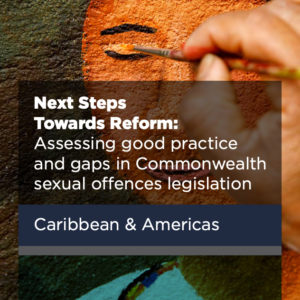The Sexual Offences Act 2009 (SOA) and the Offences against the Person Act 1864 (OAPA) are the primary pieces of legislation in relation to sexual offences in Jamaica.
While the SOA made significant changes to earlier laws, it does not conform with good practice in a number of areas. For example, it uses a narrow form of rape and non-consensual sexual assaults and does not state that marital rape and sexual assault are crimes and that there is no exception for, or defence of marriage in any circumstance. The OAPA criminalises consensual same-sex sexual activity and reflects an outdated approach to other sexual offences crimes.
A Select Parliamentary Committee of the Jamaican Parliament reported in December 2018 on its review of the SOA, OAPA, as well as the Domestic Violence Act 1996 (as amended) and the Child Care and Protection Act 2004. It recommended a number of reforms, including making marital rape a crime. However, it also recommended against extending rape or ‘grievous assaults’ to cover non-consensual same-sex and heterosexual anal penetration because this might open the crime of buggery under the OAPA to court challenge. This means non-consensual anal penetration must be charged as buggery, which is inconsistent with good practice and is not human rights compliant. It also carries a significantly lower penalty than heterosexual rape under the SOA. In 2021 the Inter-America Commission on Human Rights found the Jamaican government responsible for violating multiple rights of a gay man and a lesbian and recommended an immediate repeal of the country’s criminalising laws.
Other aspects of the law also require reform, including making adult sexual offences and child sexual offences gender-neutral, criminalising all acts of non-consensual sexual penetration, groping and touching of all body parts. With respect to crimes against children under 16, which is the age of consent in Jamaica, the SOA should be amended to provide for gender-neutral crimes with appropriate close-in-age defences to prevent criminalising consensual same-sex and different-sex sexual activity between young people and their peers. Jamaica is involved in several sexual offences law reform and international cooperation programmes, and its courts have introduced Model Guidelines for Sexual Offences Cases in the Caribbean Region.
Jamaica is a state party to relevant international and regional human rights treaties, including the Inter-American Convention on the Prevention, Punishment, and Eradication of Violence against Women (Convention of Belém do Pará), Convention on the Elimination of All Forms of Discrimination against Women, Convention on the Rights of the Child, Convention on the Rights of Persons with Disabilities, and the International Covenant on Civil and Political Rights. It has not ratified the Convention against Torture and Other Cruel, Inhuman or Degrading Treatment or Punishment.
Read more about the criminalisation of LGBT people in Jamaica.
The full assessment of Jamaica is available here.



